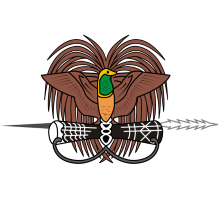Papua New Guinea: Government
Key Figures
- Chief of State:
- King Charles III ; represented by Governor General Grand Chief Sir Bob Dadae
- Head of Government:
- Prime Minister James Marape
Overview
- Government Name:
- Independent State of Papua New Guinea
- Constitution:
- Adopted: 1975; Outlines basic aspects of the country, the national legal system, basic principles of government, citizenship, the head of state, the national government, supervision and control, constitutional office-holders and constitutional institutions, and emergency powers.
- Government Type:
- Constitutional Parliamentary Democracy

Index of Economic Freedom
Country Risk Rating
Government Branches
| Main Powers | Election Process | Election Cycle 1 | |
|---|---|---|---|
| Executive | Monarch stands as a ceremonial figurehead, while the governor-general represents the Monarch of the United Kingdom by acting upon the advice of the prime minister and the cabinet. |
Governor-general is appointed by the monarch, and prime minister is appointed by the governor-general. |
At His Majesty's discretion |
| Judicial | Supreme Court hears appeals and reviews decisions made by the National Court. |
Chief justice appointed by the governor-general upon advice of the National Executive Council after consultation with the National Justice Administration Minister. Remaining judges are appointed by the Judicial and Legal Services Commission. |
Citizen judges have 10 year terms while non citizens only have 3 year terms |
| Legislative | Constitution states that the legislative power of the people is vested in the National Parliament. |
Elected through an alternative voting system. |
5 years |
Regional Trade Blocs
International Organization Participation [2]
Environmental Agreements [3]
Tax Information [2]
- Tax Authority:
- Internal Revenue Commission
- Tax Name:
- GST
Sources:
- ElectionGuide http://www.electionguide.org/
- EY, http://www.ey.com
- CIA World Factbook, https://www.cia.gov/the-world-factbook/
- U.S. Bilateral Relations Fact Sheets http://www.state.gov/r/pa/ei/bgn/


